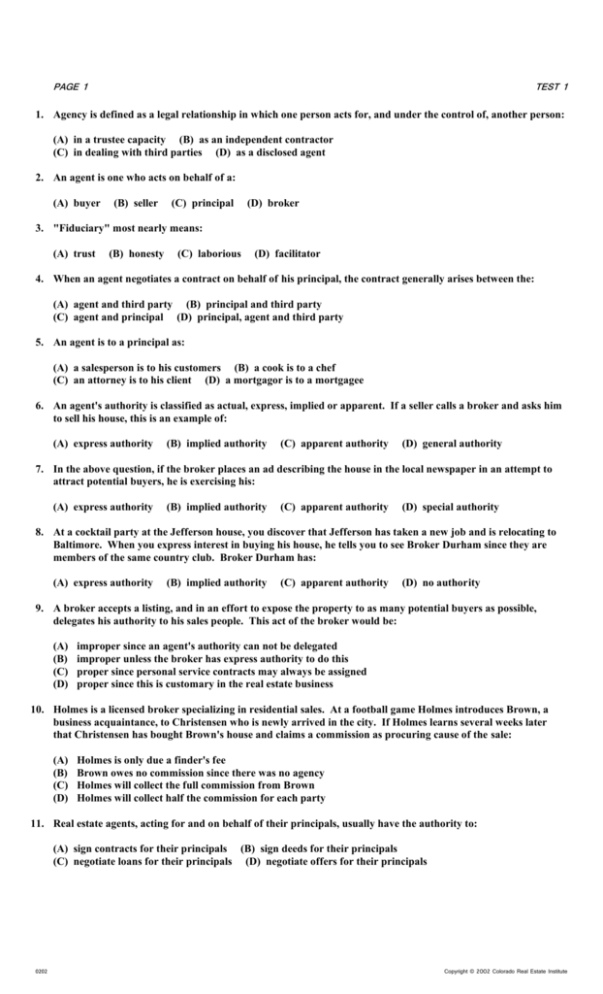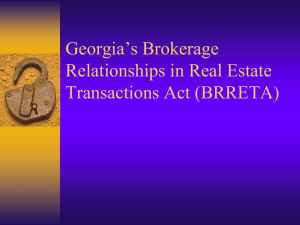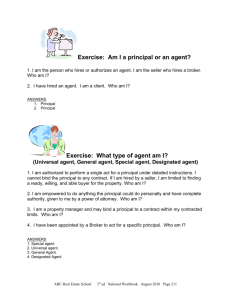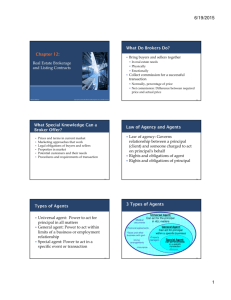1 - Wyoming Real Estate Institute
advertisement

PAGE 1 TEST 1 1. Agency is defined as a legal relationship in which one person acts for, and under the control of, another person: (A) in a trustee capacity (B) as an independent contractor (C) in dealing with third parties (D) as a disclosed agent 2. An agent is one who acts on behalf of a: (A) buyer (B) seller (C) principal (D) broker 3. "Fiduciary" most nearly means: (A) trust (B) honesty (C) laborious (D) facilitator 4. When an agent negotiates a contract on behalf of his principal, the contract generally arises between the: (A) agent and third party (B) principal and third party (C) agent and principal (D) principal, agent and third party 5. An agent is to a principal as: (A) a salesperson is to his customers (B) a cook is to a chef (C) an attorney is to his client (D) a mortgagor is to a mortgagee 6. An agent's authority is classified as actual, express, implied or apparent. If a seller calls a broker and asks him to sell his house, this is an example of: (A) express authority (B) implied authority (C) apparent authority (D) general authority 7. In the above question, if the broker places an ad describing the house in the local newspaper in an attempt to attract potential buyers, he is exercising his: (A) express authority (B) implied authority (C) apparent authority (D) special authority 8. At a cocktail party at the Jefferson house, you discover that Jefferson has taken a new job and is relocating to Baltimore. When you express interest in buying his house, he tells you to see Broker Durham since they are members of the same country club. Broker Durham has: (A) express authority (B) implied authority (C) apparent authority (D) no authority 9. A broker accepts a listing, and in an effort to expose the property to as many potential buyers as possible, delegates his authority to his sales people. This act of the broker would be: (A) (B) (C) (D) improper since an agent's authority can not be delegated improper unless the broker has express authority to do this proper since personal service contracts may always be assigned proper since this is customary in the real estate business 10. Holmes is a licensed broker specializing in residential sales. At a football game Holmes introduces Brown, a business acquaintance, to Christensen who is newly arrived in the city. If Holmes learns several weeks later that Christensen has bought Brown's house and claims a commission as procuring cause of the sale: (A) (B) (C) (D) Holmes is only due a finder's fee Brown owes no commission since there was no agency Holmes will collect the full commission from Brown Holmes will collect half the commission for each party 11. Real estate agents, acting for and on behalf of their principals, usually have the authority to: (A) sign contracts for their principals (B) sign deeds for their principals (C) negotiate loans for their principals (D) negotiate offers for their principals 0202 Copyright © 2002 Colorado Real Estate Institute PAGE 2 TEST 1 12. A general agent usually has authority to: (A) (B) (C) (D) conduct a series of transactions on behalf of his principal conduct a single transaction, but with the same general scope of authority as the principal do anything the principal himself can do do only those things authorized by the principal in writing 13. If Grover hires Smith as general manager of the Grover super market, this is an example of a: (A) special agency (B) general agency (C) apparent authority (D) implied authority 14. All of the following are examples of a principal/special agent relationship, EXCEPT: (A) a real estate broker to lease your apartments (B) an attorney-in-fact to sell your house (C) a developer to subdivide and market your property (D) an attorney to represent you in court 15. A special agent usually has authority to: (A) conduct a series of transactions for his principal (B) do anything the principal himself can do (C) do a specific, limited thing for his principal (D) hire other employees and independent contractors 16. One appointed as an attorney-in-fact is: (A) an attorney at law (B) an agent (C) an employee (D) an independent contractor 17. An attorney-in-fact, as to his principal, must act: (A) as a fiduciary (B) at arms length (C) the same as a broker acts towards third parties (D) the same as a trustee 18. The authority of an attorney-in-fact derives from an instrument commonly know as: (A) a contract of employment (B) an appointment document (C) a power of attorney (D) a listing 19. Marshall, before leaving on a six month tour of the world, appoints you as his attorney-in-fact, "to do anything that I have legal capacity to do." Your signature on a deed to Marshall's ranch, as his attorney-in-fact, would be: (A) binding on Marshall (B) invalid, since property owners must sign deeds of conveyance personally (C) invalid since the authority given by Marshall did not specifically authorize the sale of real estate (D) binding on you 20. Jackson authorizes Barth as his attorney-in-fact to sell his house. If Barth finds an acceptable buyer, he would sign the contract: (A) "Jackson" (B) "Jackson, by Barth, his attorney-in-fact" (C) "Barth, agent of Jackson" (D) "Barth, for Jackson 21. Henshaw hires you to purchase several properties anonymously as his agent so that he can acquire enough land to build a shopping center. You then enter into contracts with Black and Duval in your name to buy their land, after which Henshaw decides not to go through with the purchase. If Black and Duval sue you to enforce their contracts: (A) (B) (C) (D) you will be required to complete the contracts you are free of liability since they can only sue your principal the contracts are invalid since you were an undisclosed agent you must complete the contracts, but only if you can force Henshaw to indemnify you 22. In the above question, if Black and Duval find out that Henshaw is your principal and want to either raise the price or back out of their contracts: (A) (B) (C) (D) 0202 you can force them to sell Henshaw can force them to sell they cannot be forced to sell because of your nondisclosure they can only be forced to sell at the higher price Copyright © 2002 Colorado Real Estate Institute PAGE 3 TEST 1 23. You hire a secretary to take dictation, type and file. However, she buys paper, pencils and other supplies from a stationery store and charges them to you. You would not be liable since she is: (A) your special agent (B) an independent contractor (C) your employee (D) a general agent 24. Adams, who owns a grain storage and distribution company, hires a CPA to do an audit of his business. In an effort to determine inventory on hand, the CPA hires an engineer for $400 to calculate grain quantities in various silos. The CPA is: (A) an agent (B) a sub-agent (C) an employee (D) an independent contractor 25. In the above question, the engineer is: (A) Adams' agent (B) Adams' sub-agent (C) the CPA's employee (D) an independent contractor 26. In the question above, if the engineer rents equipment necessary to make his estimates and charges the rental to Adams, Adams is: (A) not liable for the rental (B) liable to the rental company (C) liable to the CPA (D) liable to the engineer 27. In the above question, if the engineer charges the rental to the CPA, which of the following is liable to the rental company? (A) The engineer (B) The CPA (C) Adams (D) None of the above 28. A salesperson has all of the following duties to her principal, EXCEPT: (A) to indemnify the principal (B) to use reasonable care in performing the agency (C) to account for all money and property received (D) to be loyal to the principal 29. If a broker intentionally misinforms his principal as to a zoning change that will affect the value of the principal's property, the broker has violated his duty to: (A) be loyal to his principal (B) use reasonable care in performing the agency (C) be instrumental in all things affecting the property value (D) reimburse his principal 30. When an agent receives money or other property in a normal real estate transaction, he must: (A) (B) (C) (D) make them available to the seller place them in the hands of a neutral third party place them in his operating account hold them in trust for the seller until the transaction is closed 31. Judy Myers has listed her house for sale with XYZ Realty. Which of the following is an example of XYZ's fiduciary responsibilities to Judy? (A) (B) (C) (D) Counseling the buyers as to how low Judy will go in her price Obtaining data to help cooperating brokers with their buyers Assisting buyers in obtaining title in joint tenancy Obtaining the financing terms that Judy has requested 32. Baker gives you an exclusive right to sell listing to sell his property for $40,000, including provision for a 10% commission. Carter goes directly to Baker and offers $38,000. Baker cancels his listing with you and later sells to Carter in order to net more from the sale. Baker violated which of his duties to his agent? (A) The duty to perform the agency agreement (B) The duty to reimburse the agent for his expenses (C) The duty to indemnify his agent (D) The duty to be loyal 33. A real estate salesperson's duties to the principal are: (A) (B) (C) (D) 0202 the same as the broker's duties to the principal identical to his duties to his broker the same as the principal's duties to the salesperson the same as the principal's duties to the broker Copyright © 2002 Colorado Real Estate Institute PAGE 4 TEST 1 34. You are showing a house you have an agency listing on when the prospect complains that he thinks the price is too high. You may tell him which of the following without violating the law or the code of ethics? (A) (B) (C) (D) "Submit any offer you want" "I am sure that the seller will take less" "Why not try $250 less than the listed price" "The property is worth more than it's listed for, but the seller doesn't know it" 35. John Roberts bought a house and found out after closing that the roof had been damaged by hail and needed $1,500 in repairs. In which of the following situations would the listing salesperson most likely be free of liability for the repairs? (A) (B) (C) (D) He knew about the damaged roof but did not say anything He inspected the roof but did not detect any damage He did not disclose the damage since he was not asked about it The seller told him not to say anything about the damage 36. Under the law of agency, it is prohibited for an agent to: (A) (B) (C) (D) accept expense reimbursement from his principal act as an agent for a buyer of real estate gain any advantage over his principal by even the slightest concealment or misrepresentation act as an undisclosed agent for a buyer without disclosing this fact to a seller of real estate when asked by the seller 37. A prospective purchaser comes into your real estate office wanting to buy one of your residential listings. He advises you that he wants to close as soon as possible since he has information that the property across the street will soon be zoned for high rise residential use. This comes as a surprise to you, and you should: (A) (B) (C) (D) advise your client not to accept any offers until a revised evaluation of his property can be made prepare an offer and submit it to the seller as soon as possible without mentioning what the buyer told you have the buyer sign a buyer's representation agreement, then submit the offer to the seller have another salesperson in your office submit the offer to the seller so that you can keep the purchaser's confidence 38. In which of the following cases would a broker, acting as a seller’s agent, be least likely to violate the law of agency or code of ethics when showing properties listed with him? (A) (B) (C) (D) When he tries to find a potential buyer a "good deal" When he represents to a buyer that he thinks a seller will accept less for his property than the list price When he prepares the buyer's offer and "sells" it to the seller When he tells a buyer he will never regret buying the property he is considering 39. A seller’s salesperson/agent is acting as an attorney-in fact in signing a purchase contract on behalf of the seller in the seller’s absence. This contract is enforceable between the: (A) seller and the salesperson (B) salesperson and the buyer (C) salesperson and her the broker (D) buyer and the seller 40. In entering into a contract to purchase a house for $85,000, the buyer does not disclose to the seller his knowledge that the whole area has just been rezoned for high-rise units. This is an example, on the part of the buyer, of: (A) timing (B) fraud by omission (C) misrepresentation of a material fact (D) fraud by virtue of withholding important information 41. Expenses of the real estate agent, in the normal listing contract, are paid for by: (A) the principal (B) the agent (C) the agent and principal equally 0202 (D) the title insurance company Copyright © 2002 Colorado Real Estate Institute PAGE 5 TEST 1 42. A salesperson's normal automobile expenses for gas and repairs are usually paid by: (A) (B) (C) (D) the seller if the property is sold the broker if the property is sold the salesperson, whether or not the property is sold the broker, whether or not the property is sold 43. You obtain a listing from Jordan on his house at 438 Maple Street. The listing cites that the owner may list with other agents, that you will receive a commission only if the seller accepts an offer that you present, and that the owner may sell the property himself without owing a commission to anyone. The listing you have is: (A) an open listing (B) a net listing (C) an exclusive right to sell listing (D) an exclusive agency listing 44. A listing which cites that the broker will receive a commission regardless of who sells the property is: (A) an open listing (B) a net listing (C) an exclusive listing (D) an exclusive agency listing 45. Jenks authorizes you to sell his house for $80,000, with anything over that amount to go to you as commission. This is an example of: (A) an open listing (B) a net listing (C) an exclusive right to sell listing (D) an exclusive agency listing 46. When a seller lists his property, but reserves the right to sell the property himself and not be obligated to pay a commission, he would be listing with a (an): (A) exclusive agency listing (B) net listing (C) exclusive right to sell listing (D) multiple listing 47. The disadvantage to a seller of giving an open listing is that: (A) (B) (C) (D) the seller never knows who will be showing the property broker protection is not sufficient to encourage any broker to expend his time and energy the seller will owe a commission to more than one broker if the property sells the seller cannot sell the property himself 48. Dangers to a broker in taking a net listing include all of the following, EXCEPT: (A) (B) (C) (D) accusation by the seller of fraud if the broker collects an inordinately high commission no commission to the broker if all he can obtain from a buyer is the net amount required by the seller an angry buyer, if the latter learns that the seller's price and the broker's price are different no protection to the broker since a net listing cannot be combined with an exclusive listing 49. A property manager has all of the following duties to his principal, the property owner, EXCEPT the duty to: (A) preserve the improvements on the property (B) account for security deposits (C) invest profits from the property (D) see that the property is properly maintained 50. Broker Anthony decides to sell his real estate agency to broker Carlson. He may do this by selling him the business and its good will, and regarding his listings: (A) (B) (C) (D) 0202 assigning them transferring them by novation obtaining assignment approval from each of his principals endorsing each listing in favor of Carlson Copyright © 2002 Colorado Real Estate Institute






